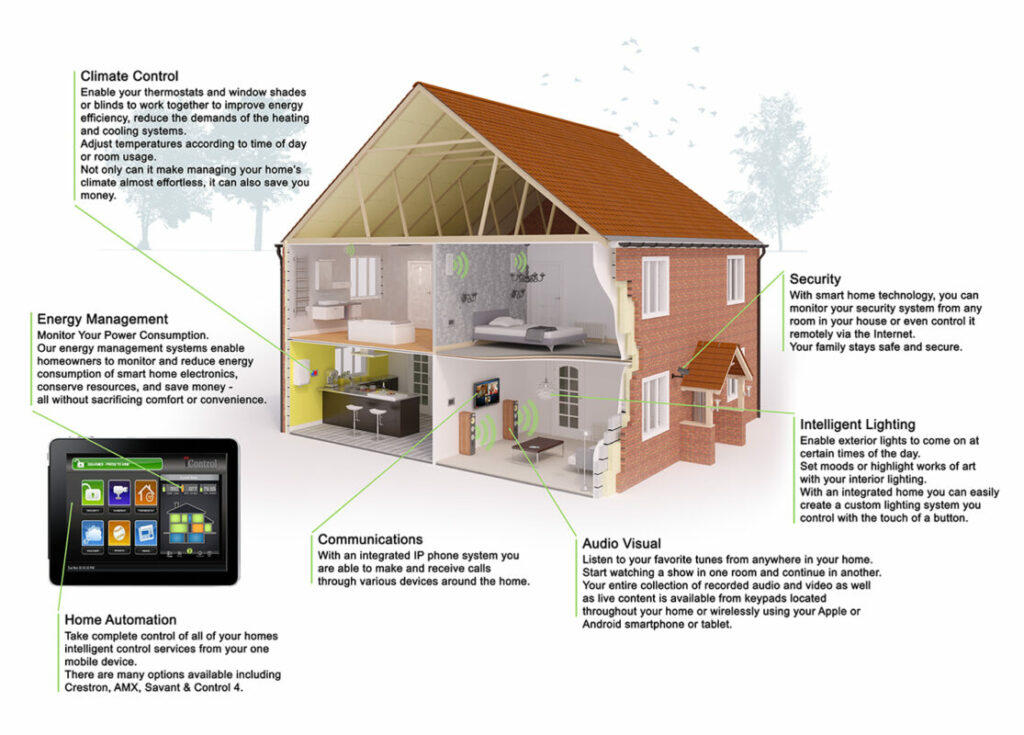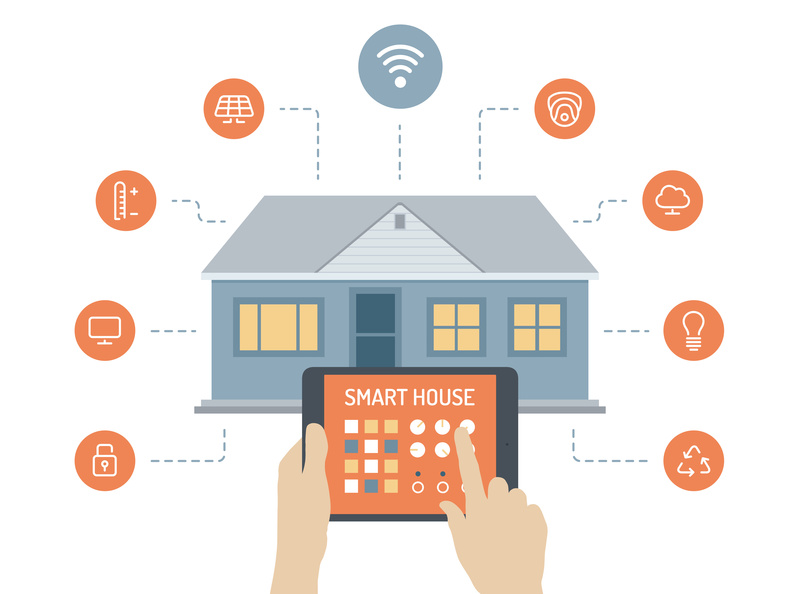What is a smart home?
A smart home, also known as a connected home or intelligent home, is a residence that uses internet-connected devices to enable the remote monitoring and management of various household functions. These functions can include lighting, heating, ventilation, air conditioning, security systems, entertainment systems, and appliances. With the use of smart home technology, homeowners can conveniently control and automate these functions through their smartphones, computers, or voice assistants.
Advantages of smart home devices
Smart home devices offer numerous advantages that enhance the convenience, comfort, efficiency, and security of a household.
Firstly, they make it possible to control various aspects of a home remotely. For instance, homeowners can adjust the temperature, turn lights on or off, or lock their doors from anywhere, thus ensuring peace of mind and saving time. Moreover, smart home devices can improve energy efficiency, leading to reduced utility bills and a smaller environmental footprint. For example, smart thermostats can learn household patterns and automatically adjust temperature settings accordingly. Lighting systems can be programmed to turn off automatically when a room is unoccupied. In terms of security, smart home devices provide advanced monitoring and prevention capabilities.
Homeowners can integrate security cameras, door/window sensors, and motion detectors, allowing them to receive instant notifications of any suspicious activity. Additionally, the ability to remotely control lighting and simulate presence can deter potential burglars.
Functionality and Key Components
The functionality of a smart home is driven by its interconnected nature and the integration of different devices working together. Here are some key components that make a home “smart”:
Home Automation
Automation lies at the heart of a smart home. It enables users to schedule and control various functions, ensuring they seamlessly coordinate with daily routines. For instance, you can set the thermostat to adjust the temperature based on occupancy or regulate the lighting to create the perfect ambiance for different times of the day.
Voice Assistance
Devices equipped with voice assistants, such as Amazon Echo or Google Home, have revolutionized the way we interact with our smart homes. Commands can be given to control temperature, play music, set reminders, and even make online purchases, all through simple voice commands.
Connected Appliances
Smart appliances, like refrigerators, washing machines, and ovens, have the ability to communicate with one another, providing users with updates on food freshness, energy usage, or even recipe suggestions based on available ingredients. These appliances can be controlled remotely, making it possible to start or monitor tasks while away from home.
Smart Security
Smart home security systems offer features like facial recognition, motion detection, and remote monitoring. Users can receive real-time alerts on their mobile devices, granting peace of mind and the ability to take immediate action when necessary. Entry points, such as doors and windows, can also be equipped with smart locks, offering enhanced security.

How it works?
Popular smart home devices
- Amazon Echo: This voice-activated smart speaker, powered by Alexa, allows users to control various smart home devices, play music, answer questions, and much more.
- Google Nest Hub: This smart display integrates with other smart home devices, provides visual and spoken information, and allows users to control various functions through touch or voice commands.
- Philips Hue: This smart lighting system offers a range of bulbs, light strips, and accessories that can be controlled remotely. Users can adjust the brightness, color, and even sync the lights to match movies or music.
- Ring Video Doorbell: This smart doorbell comes with a built-in camera, motion sensors, and two-way audio. It allows users to see and speak with visitors from anywhere using their smartphones.
- Ecobee Smart Thermostat: This smart thermostat learns household patterns, provides energy reports, and can be controlled remotely. It helps homeowners optimize their energy usage and reduce heating and cooling costs.
The Future of Smart Homes
As the technology surrounding smart homes continues to evolve, there are several trends on the horizon that hint at the limitless potential of this innovative concept:
Increased Energy Efficiency
With the rise of renewable energy sources, smart home technology is becoming better equipped to manage and optimize energy consumption. From intelligent thermostats that learn your temperature preferences to smart lighting systems that adjust based on natural lighting conditions, these advances pave the way for a more sustainable future.
Health Monitoring and Wellness
Smart homes have the potential to contribute to our overall well-being. Integrating devices that can monitor vital signs, detect falls, or track sleep patterns can provide early intervention and assist in monitoring the health of the elderly or individuals with specific health conditions. Furthermore, the ability to create an environment tailored to promote relaxation and reduce stress could have significant positive effects on mental health.
Seamless Integration
As the Internet of Things (IoT) expands, we can expect smart homes to seamlessly integrate with other IoT devices and systems. Imagine a world where your smart home interacts with your smart car, enabling a seamless transition from the moment you leave your house to the moment you start the car, with personalized settings and assistance.
Conclusion
The concept of a smart home has transformed from a futuristic idea into a tangible reality. With the advent of sophisticated technology, the comfort and convenience of the modern household have taken on a whole new meaning. From automation and interconnectedness to voice assistants and enhanced security, smart homes have revolutionized our living spaces. As we embrace the boundless possibilities of this technology, the future of smart homes holds the promise of enhanced energy efficiency, improved health monitoring, and seamless integration into our daily lives. The era of smart homes is upon us, and the possibilities are truly endless.


Pylyp Slipchenko says:
Nice article, thank you
Pylyp Chen says:
You’re welcome! Glad you found the article helpful. Let me know if you have any other questions about smart homes!
Pylyp Chen says:
Thanks, Pylyp! I appreciate your helpful answer. I do have one question: how easy is it to install a smart home system?